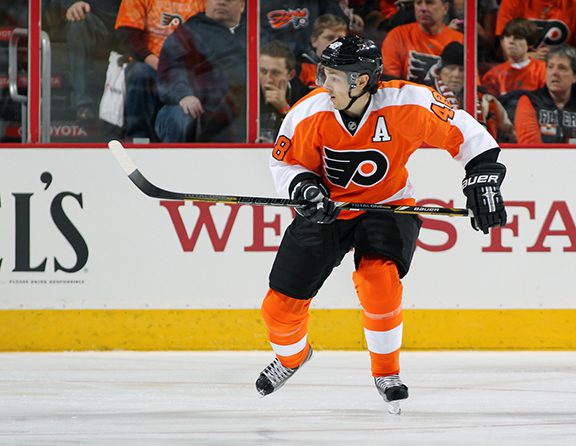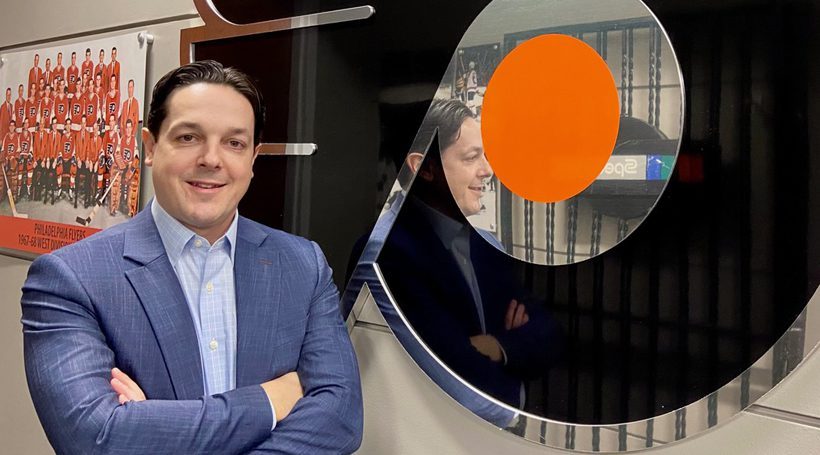Danny Brière is counting his blessings. New job. New baby. And the chance to stay involved in the sport that has defined his life with the team that defined his career. Cue the signature knee down and fist pump.
In his 17-year career with the NHL, Brière spent 6 memorable seasons with the Flyers, which may be why this Canadian considers this area his home. “When I retired in 2015, I moved back here,” says Brière, with only a trace of an accent. “I’ve been here ever since. Even my last 2 years when I left the Flyers, I kept my residence here. I played one year in Montreal and one year in Denver. The kids stayed in the area, and I basically went by myself during the hockey season.”
Brière has 3 sons from a previous marriage – Caelan, 24, Carson, 22, and Cameron, 21. In 2021, he wed Misha Harrell, DO, a retired flight surgeon with the U.S. Armed Forces, and they welcomed another boy, Caiden, in March of last year. “It’s a change of pace, and another start,” says Brière,”but it’s exciting. My wife and I are really enjoying the little one.”
Joyful new stats characterize Brière’s life these days. Last year, the Flyers named the 45-year-old as the new special assistant to General Manager Chuck Fletcher. Brière is now involved in all aspects of the club’s hockey operations, including scouting and player development. “I’ve been very fortunate my whole life to play hockey,” says Brière. “And now I get to keep going.”
After finishing last in the Metropolitan Division in 2022, the Flyers were ready for some changes. In June, they selected John Tortorella, a 20-year NHL veteran, as head coach. Brière was involved in the critical round of interviews.

There’s no question that Brière brings a formidable track record to the executive staff. In 2007-08, he was a decisive factor in the Flyers making the playoffs, and he helped lead the team to the 2010 Stanley Cup Final. Briere is a 2-time NHL All-Star (2007 and 2011), an All-Star MVP (2007), and he brings NHL experience from rival teams, including the Phoenix Coyotes, Buffalo Sabres, Montreal Canadiens and Colorado Avalanche. At 5’9”, he was the guy who wasn’t as big as some of the other players, but made up for it in skill. As a result, he’s known as one of the top Stanley Cup Playoff performers in NHL history. Plus, Brière knows the players – the ones he has played against and those within the Flyers organization. For 2 seasons, before his new job, he worked part-time in Flyers’ player development.
“That was my start in management at the NHL level,” says Brière. “I worked with our crew, trying to get our players better prepared, more ready when their names are called.”
He also honed his business skills by completing the general management program at the University of Pennsylvania’s Wharton School in 2021. In his new role, his duties are varied, as are his days. “There’s no typical day and that’s the beauty of it,” he says. “I’m involved a little bit in every department when it comes to amateur scouting, pro scouting, player personnel. I get to touch on a little bit of everything, and it’s been so much fun.”
What does Brière look for in a player? “The ideal player is big, fast, strong, works hard and is a great leader,” he says, “but everybody wants those players. Hockey sense is a big part of it. Then it comes down to leadership qualities, speed, size. There are many things that come into play, including what you need. One day you might be in search of a big physical defenseman, and the next day it may be an offensive puck-moving player. Sometimes with injuries, that changes really quickly in a season, like the last few years as we were hit by the injury bug. It keeps you on your toes.”
Being in management is not exactly like playing for the Flyers, admits Brière. “It’s definitely an adjustment in the sense that when you’re playing, you’re in the action and you’re in control,” he says. “In management, you’re at the mercy of the players. You make decisions but then you put your trust in the players. I remember as a player never being very nervous when a game was going on. Now that I’m not playing, I find it’s the opposite. It can be nerve-wracking as well as exciting.”
As for his return to Philly, it’s less of a homecoming and more of feeling at home. “In my mind, I’ve been a Flyer for a long time,” he says. “I feel fortunate that I can still be involved in hockey here, in the place that I’ve been calling home now for 15 years.”














